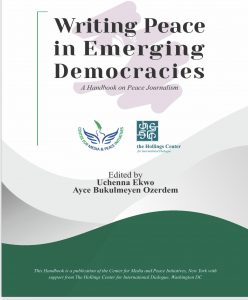Training
With a great reliance on its extensive international network, the Center operates as a facilitator and partner in a wide variety of training projects, publishes and disseminates significant communication scholarship and advances the communication discipline through meaningful research, teaching and service.
CMPI shares a commitment to make better sense of the role communication plays in global politics and the relationship between communication and conflict.
The news media can be a crucial tool for mobilizing public opinion in favor of peace processes. What is the ability of political leaders and journalists to promote peace through the news media?
There are at least three major ways in which the news media can serve as obstacles to peace: (1) by focusing on events rather than processes; (2) by focusing on the unusual, the dramatic, and the conflictual aspects of the process; and (3) by making it difficult to conduct successful negotiations.
Similarly, the news media can create opportunities for peace, reconciliation, and conflict prevention.For journalists to live up to their professional responsibilities in peace building, they must evaluate the avalanche of propaganda from parties in conflict. All too often, journalists are caught up between the propaganda machinery and the audience. Journalist should not support a policy of violence in their reporting. While reporters should report, as accurately and fully as they can, the facts they encounter, they should aspire to create opportunities for society at large to consider and to value non-violent responses to conflict.
CMPI training focuses on media’s obstacles and opportunities for peace building and nonviolence.
Peace Journalism and Consolidation of Democracy Project (PJCDP) in Nigeria
Case Study: Summer Institute and Online Certificate Program
Through out its history CMPI has run occasional certificate programs through its summer institute. The institute features a series of two-hour sessions conducted during one intensive week. A single presenter will lead some, while others will use a panel format. All will be interactive and aimed at building skills. An important benefit of the face-to-face format is that it enables journalists from around the world to network with one another to share ideas and experiences. Immediately following the on-campus program, there will be four days of field trips to meet with journalists in selected cities. The field trips include visits to newspapers, radio and TV newsrooms and online sites.
The program has four courses. Persons satisfactorily completing all four earns a diploma-style certificate and an official transcript.
The certificate courses are:
1. Public performance measurement – tools for assessing government efficiency and effectiveness.
2. Journalism and government – the relationship between reporters and media, working with bureaucrats and public agencies.
3. Political culture – how to understand and work effectively within the culture of the reporters’ home countries.
4. Policy analysis – how to understand and report government plans and actions, including public budgets.
Courses is offered online, asynchronously making them accessible to journalists with busy schedules and located in different time zones. Each course is typically five weeks in duration.
Both the institute and the certificate program will bring about lasting, visible change in how news is reported. In preparation for their careers, journalists everywhere learn the craft but not the news content. Most start out as generalists. Some eventually come to specialize in public affairs, but learn the subject on-the-job, without formal education. The institute and the certificate program give those who take them substantive knowledge that will indelibly change their perspective.
Finding Women’s Public Voice
At this year’s Women and the Media Conference, Center for Media and Peace Initiatives – CMPI is bringing together female leaders from the public and private sectors for a frank and forward-looking discussion about the status of women in this moment of reckoning for women’s voices to be heard. The forum is also designed to amplify the voices of women in foreign policy, national security, and international business. It convenes top-level leaders to discuss critical and timely issues in their respective fields, reflect on their professional experiences, and share ideas.
CMPI seeks to share experience and best practices on their work to promote and protect women’s rights. They will focus on how to change the status of women and girls with a focus on obstacles – legal, economic, cultural and structural – that lead to discrimination against women and create inequality. Further, discussions will include practical suggestions on how to eliminate such discrimination and to empower women towards greater equality.
The Conference will be divided into substantive sessions and working groups, providing CMPI the opportunity to focus on specific areas from different perspectives and experiences.
Who are the women shaping our future — and what are their agendas? Where can women find common ground at a time of division? How are women taking their place at the table in the public and private sectors — and what difference can they make there?



